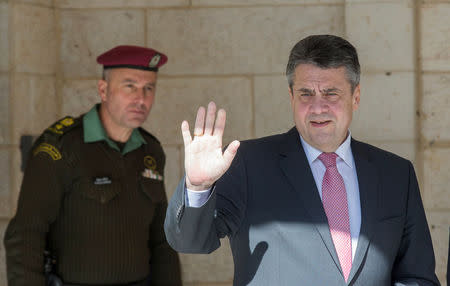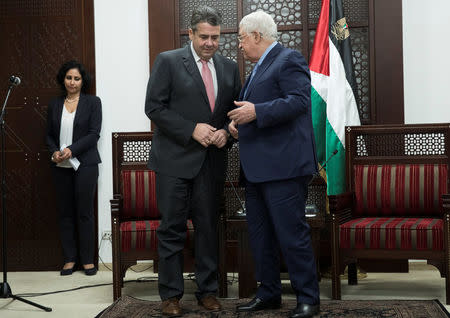German minister warns Israel it faces growing frustration in Europe
TEL AVIV (Reuters) - German Foreign Minister Sigmar Gabriel warned Israel on Wednesday that it faced growing frustration in Europe amid concern for the future of a two-state solution to the Israeli-Palestinian conflict. Gabriel adopted a markedly different tone to that of U.S. Vice President Mike Pence, who on a visit to Israel last week embraced President Donald Trump's Dec. 6 announcement that his administration recognizes Jerusalem as the capital of Israel, and that it will move the U.S. Embassy to the city. "With regard to the Palestinians and the Iran question the Americans are taking your side more clearly than ever before. But is this really only a good thing?" Gabriel said in Tel Aviv. Citing past successes of U.S. diplomacy in the region, he asked: "Can the Americans still play such a role if they take sides so openly? Will others try to step into their shoes?" In a thinly veiled threat about cutting off aid, he said some members of Israel's cabinet were "explicitly against the two-state solution" but that such a solution "has always been the foundation of our engagement for Israeli-Palestinian peace and for the large amount of funding" from Germany and Europe. "These – at best mixed – signals do not go unnoticed in Europe, where there is clearly growing frustration with Israel's actions," he told an Israeli security conference. Gabriel cited disagreements even within his own Social Democratic Party about what some see as "unfair" treatment of the Palestinians. "NO SHORTCUT" "It is increasingly difficult for people like me to explain to them the reasons why our support for Israel must persist," he said. Gabriel pointed to concerns about violence, hatred, and Israeli settlement-building in occupied territory that Palestinians seek for a future independent state. "Germany is looking forward to the day when it will be able to move its embassy in Israel to Jerusalem. But let me add: in two states with Jerusalem as their capital. There is no shortcut here." Palestinians want East Jerusalem, which was captured by Israeli in a 1967 war, for their future capital. Israel regards Jerusalem as its eternal, indivisible capital. Gabriel spoke after meetings with Israeli Prime Minister Benjamin Netanyahu and Palestinian President Mahmoud Abbas. Earlier in the day Netanyahu corrected the record during a joint news conference held with his German visitor after Gabriel said he was encouraged that Netanyahu's government supported a two-state solution "with secure Israeli borders". "That we will control security west of the Jordan (river). That is the first condition," Netanyahu objected, cutting Gabriel off and adding, "Whether it’s defined as a state when we have the military control is another matter. I'd rather not discuss labels, but substance." Gabriel suggested that the discussion might be revisited at another time, "far away from now". Gabriel has been an outspoken supporter of greater efforts to combat anti-Semitism in Germany, including creation of a new government commissioner post to oversee such initiatives. At the same time, he is under pressure at home to take a hard line on the continued building of Israeli settlements in violation of international law. (Reporting by Stephen Farrell and Andrea Shalal; editing by Mark Heinrich)






